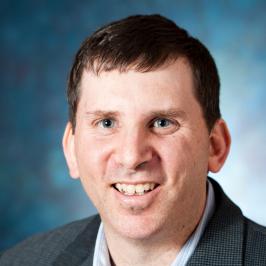As the coronavirus pandemic forced nearly all communal life online, how did Rabbi Lily Solochek prepare to serve Maine’s Adas Yoshurun Synagogue?
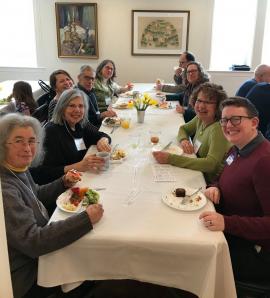
Rabbi Lily Solochek (front right) at pre-pandemic Adas Yoshurun gathering
Not by taking “How to Be a Rabbi During Pandemic,” Solochek noted dryly, since such an elective had never been offered at Reconstructionist Rabbinical College (RRC) or any other rabbinical seminary. There was a steep learning curve for the rabbi, who was still a rabbinical student when the pandemic began, and for the small but growing Maine community. Before the shutdown, few of its members had ever used Zoom.
Yet Solochek said that RRC more than prepared them to solve problems and meet the moment. (Solochek uses the gender pronouns they and them.)
“On the one hand, I could say nobody taught me how to do this. The flip side of that: being able to respond in this moment comes from a culmination of all the parts of rabbinical school,” said Solochek.
Those parts include extensive study of Jewish texts, liturgy and tradition; faculty supervision; training in pastoral counseling; and immersive field education, which means working in a rabbinic capacity in a variety of settings.
To tackle some of the inexhaustible questions that came up — for instance, finding the optimal webcam position for standing and reciting the Amidah while leading online services — they consulted with RRC faculty, classmates and a network of Reconstructionist rabbis.
“Right before I did my first online shiva, I posted in the Reconstructionist Rabbinical Association’s Facebook group and I said, ‘I have to do a shiva on Zoom. This feels really complicated. It’s probably much simpler than I think it is. If you’ve done it, can we talk?’ ” recalled Solochek, now a 2020 graduate.
Within minutes, they were on the phone with Rabbi Lauren Grabelle Herrmann, a 2006 RRC graduate and spiritual leader of SAJ: Judaism That Stands for All, the congregation founded by Rabbi Mordecai Kaplan on Manhattan’s Upper West Side.
“There have been a lot of these moments of learning from rabbis who have been doing their jobs longer than I have. They have been willing to share their ideas on what’s worked for them and what hasn’t worked for them,” they said. “And as well as a shiva call could go, I think it went incredibly smoothly.”
Field education is an integral part of training to be a rabbi at RRC. In a wide array of rabbinic settings — congregations, religious schools, campuses, social-justice organizations, hospitals — students learn by doing, working under the supervision of experienced professionals and RRC faculty.
Elsie Stern, Ph.D., Vice President for Academic Affairs, said that even as nearly all Jewish life (as well as life in general, for that matter) migrated online, field education continued unabated with RRC students providing much-needed spiritual sustenance, Jewish connection and pastoral counseling to individuals and communities in need. “Students are learning in real time how to be online rabbis. Much of what students are discussing in supervision is how they take what they have learned to be responsive to the needs of the pandemic.”
(Classes continued without disruption as well, moving from in-person to online. The same was true for RRC communal rituals, such as Senior Torah, a gathering in which soon-to-be-graduates share words of wisdom with classmates, faculty and staff.)
Rabbi Deborah Waxman, Ph.D., president of Reconstructing Judaism, echoed that sentiment in the organization’s Annual Report video. “Field supervisors supported students as they took on the responsibilities of leading services, visiting the sick, teaching classes, checking in on college students, presiding over funerals and shiva minyans, all while sheltering in place.”
Faculty and administration are developing an updated curriculum set to launch in the coming academic year, which will place an even greater emphasis on field placement and on synthesizing classroom and on-the-job learning.
No one likely understands the challenges students faced and overcame more than Rabbi Linda Holtzman, a 1979 RRC graduate who serves as acting director of Rabbinic Formation and Student Life. While supervising students in group and individual settings, she encountered one question that kept coming up: How can offline activities be adapted for online use? After all, adults have a hard time sitting on Zoom for two hours, much less religious-school students.
“What I know is that if we stay together and we keep talking it through, and we keep figuring it out and really drawing upon Jewish tradition, we can make it work,” said Holtzman.
She encouraged her students to focus on the lay-rabbinic partnership that is at the heart of Reconstructionist Judaism, asking questions about what individuals and communities need.
“What is it they are asking for? Maybe the surface ask is for Shabbat-morning services, but the real ask is, ‘We want to be together. We want to feel like a community together. We want to hear each other. We want to know that we’re all safe,’” said Holtzman.
After Jewish life went virtual, many communities experienced dramatic rises in participation at services and other gatherings. That has impacted the work of RRC students, transforming their relationship with the people they serve — perhaps none more so than Solochek.
Until March, they had practically lived out of a suitcase: residing in Manhattan while traveling once a week to RRC outside Philadelphia and twice a month to Adas Yoshurun in Maine’s Midcoast region, where they had been working as its rabbi since 2019. With the pandemic, a planned July move to Maine got moved up to April.
In the beginning, they were focused on continuing existing programs like Shabbat services. (With few members owning prayer books, they created Google Slides and PowerPoint, so everyone could follow along.) But it was also clear that members felt a need to connect — perhaps in ways more urgent than before. For the first time, at least in recent memory, the congregation launched a daily program: a 20-minute community check-in call during which members recite the Mi Shebeirach (prayer for healing) and the Mourner’s Kaddish. Often, someone recites a poem or piece of Jewish text.
Solochek said that nearly everyone they have spoken with has expressed feelings of loneliness, regardless of whether someone lives with others or on their own.
“Everybody’s saying, ‘I feel lonely. I feel isolated. It’s causing me to feel very sad,’ ” said Solochek. “So hopefully, with a little bit more structured connection between people, we can help offset that a little.”
Their RRC training proved as essential in discussing logistical questions as it did with providing pastoral counseling or adapting Jewish rituals for online use.
“Our role as rabbis is being a compassionate, caring, voice to people,” they said. “That is something that I absolutely was taught in school by many of my teachers.”
Online Community
Other RRC students working with congregations also reported that interactions with members became more frequent and intense.
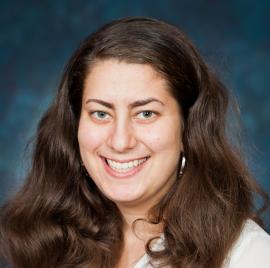
RRC Student Sarah Brammer-Shlay
Sarah Brammer-Shlay recently completed her second year as the rabbinic intern at SAJ: Judaism Stands for All in New York. Before the pandemic, she would make semi-regular pastoral visits to congregants. Once people began sheltering-in-place, those visits became weekly phone or Zoom calls.
In her weekly class on Jewish prayer, it was clear that checking in with participants, coupled with pastoral support, was now a central piece of the class, in addition to the meaning of liturgy.
“This moment brings up a lot of feelings of loneliness and isolation. Some of that is just emotional, some of that is fear of people getting sick themselves or family members getting sick, and, also, the economic impact of the situation,” explained Brammer-Shlay. “There’s a lot of stresses in people’s lives right now, and all the stresses that people had before the pandemic didn’t go away. In fact, for many people, they’ve gotten worse. There’s a great deal of need for people to feel connected right now. Meeting that need is the core of the pastoral work.”
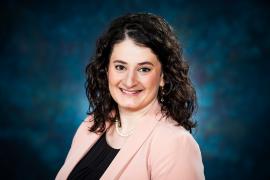
Rabbi Janine Pastor
Rabbi Janine Jankovitz Pastor, a 2020 RRC graduate who is the new rabbi at Congregation Beth El Ner Tamid, a Conservative synagogue in the Philadelphia suburbs, spent the past year as the rabbinic intern at Congregation Beth Israel, a Reconstructionist affiliate also outside of Philadelphia. Jankowitz Pastor said that once activities switched from in-person to online, “my connection with the congregation exponentially grew. I felt much more in tune with the congregation. I was interacting with them at least two to three times a week, whereas before it was a few times a month.”
Suddenly, Jankovitz Pastor could do all kinds of things that would have been difficult, if not unimaginable before, like lightening the mood by beginning a service or class by sharing a video of something that brings her joy, like the Georgia Aquarium’s beluga whale.
She acknowledged that while leading services online, it can “be hard to know if you are really connecting with people spiritually. When I’m singing, I don’t hear them singing. I never wanted to be in a position where I was performing services, rather than leading services.”
Serving Students No Longer on Campus
The pandemic also transformed the field education of rabbinical students working on college campus settings.
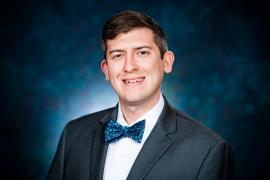
Rabbi Zachary Wiener
Rabbi Zachary Wiener, RRC ’20, just finished a rabbinic internship at Drexel University in Philadelphia. (Wiener is next headed to Chicago to be a chaplain at the Rush University Medical Center.) Throughout his two-year internship, he relied on Hillel’s physical space for spontaneous and regular interaction with students.
“Most of what made the internship really fun for me was sitting at my desk and having students drop in. That is how I kept tabs on how the students were doing,” he said.
When the university moved online and most students went home, he “had to go out and find them through Facebook messaging, texting, phone calls. I can’t take for granted anymore that they are going to show up. I think that the students feel the loss, too. So much of college is hanging out and being around campus, and students really depend on the unstructured time.”
So how was he able to be present for students during a time of anxiety and uncertainty?
“The situation has been this massive global disruption, but the basics of rabbinics that I have learned at RRC haven’t changed much. Fostering spiritual vibrancy comes out of making connections. That is where the work is the same,” he said. “Torah hasn’t changed. The wellspring of our tradition is so wide and deep there is always something to draw from to speak to this moment. As long as we rabbis are oriented towards being a vessel of Torah and making Jewish meaning happen through relationships, the rest of it is thoughtful adaptation, which we are good at and our tradition is good at. As Reconstructionists, we don’t fear change, we don’t just cope with change; we celebrate change. Change isn’t a threat. It is an essential part of an evolving Jewish civilization, and it’s at the heart of the work we do as Reconstructionist rabbis.”
As interfaith chaplain at Bryn Mawr College, Rabbi Nora Woods, RRC ’20, serves not just Jewish students, but students and faculty of all backgrounds. Even before the pandemic shut down life in the United States, Woods was offering pastoral counseling to several students from Wuhan, China. Later, after most students went home, she was offering remote counseling to Italian students living in lockdown, as well as to several undocumented immigrants living in fear of deportation. For the next year, Woods is continuing in this role, which also includes advising all campus faith groups.
She noted that some of her students needed an outlet to express grief for the opportunities and routines that had been lost.
“I think people wanted to just pause and connect, and have some space for grief,” she said.
Rabbi Michael Perice’s field education offered him, if not a unique perspective on being a spiritual leader during a pandemic, then at the very least a valuable one. The 2020 RRC graduate simultaneously served in an online and in-person capacity.
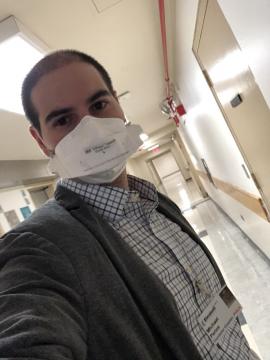
Rabbi Michael Perice on chaplain duty during the COVID-19 pandemic
As a rabbinic intern at Temple University Hillel in Philadelphia, he was part of the team that planned and implemented Hillel’s response to the physical shutting down of campus. At first, said Perice, he and his co-workers tried to maintain a sense of normalcy and continuity by moving most of the regular programming online.
“I don’t think we gave our students enough time to adjust to this new reality before we started hitting them with content. They needed a period of time to get home to their families and adjust. We were ready to go right away, but I don’t think our constituency was ready,” he noted.
He soon found that group activities that were somewhat lighter in tone and didn’t require a ton of time on Zoom resonated with students. One idea he had that seemed to land with students was a weekly discussion of an episode of “The West Wing,” the late 1990s’ drama about a liberal U.S. president and his staff. Those discussions, he said, ended up focusing on Jewish values, and in an indirect way, how students were coping.
“I was in a pastoral mindset,” he said. “Some students are not in a very accessible place for it. Others were in a very real need of it.”
During this time, Perice also worked as chaplain at Einstein Medical Center, a large hospital in Philadelphia where he had done his training in Clinical Pastoral Education. During trying months, he provided much-needed spiritual counseling to medical staff, and often served as a key conduit between COVID-19 patients and their families, who were prohibited from visiting. On many shifts, Perice grappled with his own fears of getting sick.
“Sometimes, when you put on that kippah, it really does change you,” he said. “My call to serve people has at times been stronger than my fear. That call really overpowers the fear and gets me through the door. This pandemic has reaffirmed the importance of what we do.”

